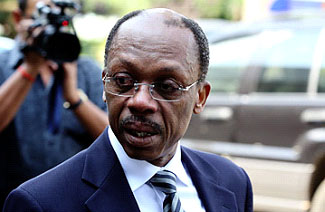PORT-AU-PRINCE, (Reuters) – His name is not on any ballot paper and he was toppled from power 12 years ago but the shadow of Jean-Bertrand Aristide still looms over Haiti and his supporters are at the center of a new crisis in the impoverished country.

Despite the divisions in his party “Fanmi Lavalas”, or “The Flood”, and his official retirement from politics, Aristide’s influence has quietly grown since he returned from exile in South Africa in 2011.
Three of the four top candidates in the flawed first round of Haiti’s presidential election in October fully or partly draw strength from Aristide’s followers, and his name is uttered with reverence by poor protesters whose violent demonstrations last week forced the run-off vote to be called off.
The moves Aristide and his political heirs make in the next few weeks could determine Haiti’s immediate future more than at any time since the former priest-turned-president was toppled from power in 2004.
“Aristide is the engine of this movement. Without him we cannot live,” said unemployed protester Fredo Dorival standing near smoldering tires and rubble at a march from Port-au-Prince’s St Jean Bosco parish, where Aristide once presided.
Haiti was supposed to choose a replacement for outgoing President Michel Martelly on Sunday but the two-man run-off was postponed indefinitely after opposition candidate Jude Celestin refused to participate over alleged fraud that sparked the protests and violence.
Aristide’s supporters want their candidates put back in the race – a position that puts them in direct conflict with both the government and the international community, and potentially with Celestin, who currently enjoys their backing as the default opposition candidate.
Aristide himself, who was twice elected president and twice ousted in coups, is constitutionally barred from running again.
Since he returned from a seven-year exile in 2011 to a country on its knees from a devastating earthquake, Aristide, 62, has kept a low public profile, officially dedicating his time to a university bearing his name.
His most recent, rare, appearances were to vote in October and to endorse Maryse Narcisse, a doctor, as Fanmi Lavalas’ presidential candidate. He did not respond to request for an interview for this article.
But he remains involved in his party’s strategy.
“He has played a role as a captain, now we hope he will accept a role as coach,” Narcisse told Reuters, adding that she consults with Aristide regularly and would want him as a senior adviser if she were to become president.
Speaking beneath a campaign poster of Aristide holding her raised hand, Narcisse said her political mentor predicted in October the vote would be “a selection not an election” – a catch phrase that has defined the opposition’s fraud claims and galvanized protesters.
“He respects the Haitian people, and the Haitian people are mobilizing,” Narcisse said. “The mobilization will continue.”
Haiti now has to decide whether the election run-off between Celestin and ruling party candidate Jovenel Moise should go ahead, or be scrapped to again include Narcisse and others.
